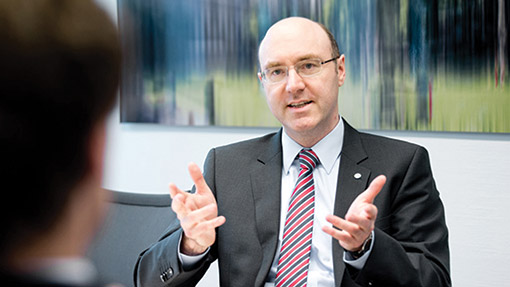Bayer embraces seed breeding to counter slower growth

Bayer CropScience hopes its three-pronged strategy focusing on agrochemicals, seeds and biological products will help it cope better with slowing growth ahead as commodity markets slide.
The group has been investing heavily in plant breeding and non-chemical products to bolster its traditional agrochemicals business, which still accounts for more than 80% of worldwide sales.
As part of this move, Bayer kicks off its first plant breeding in Britain this autumn with a wheat programme, while it gained its first major biological product, Serenade, two years ago.
Investment is skewed towards these newer areas of breeding and biologicals, but the German group still racks up annual sales growth in excess of 10% from its older agrochemicals business.
“We expect growth from all three areas. Biologicals may be seeing bigger growth, but it’s coming from a lower base,” the group’s chief financial officer Michael Schulz tells Farmers Weekly.
With a turnover of €8.82bn (£6.88bn) last year, the Monheim-based company is second only to Syngenta in terms of worldwide agrochemical sales.
Bayer started building up its plant breeding and seeds business about 15 years ago, and it has made big market share gains in areas such as for canola (oilseed rape) seed in Canada.
“In oilseeds, cotton and vegetable seeds we have built up leading positions from a small share, so now we hope to repeat this with soya and wheat,” he adds.
The group saw its first variety make it on to the HGCA Recommended List last December with the arrival of Harper winter oilseed rape. It is now looking to follow that with success in wheat breeding.
Its seeds business may only make up 14% of group sales, but it is growing faster than agrochemicals and accounts for one-third of the group’s annual research budget of nearly 1bn euros.
In Britain, Bayer will start testing wheat varieties this autumn near Cambridge and then commence wheat breeding in 2015.
Bayer is likely to start testing wheat varieties from its French and German breeding programmes, but aims to fast-track breeding in Britain and is optimistic enough to predict it could be selling commercial wheat seed in four years’ time.
The company, best known for pesticide products such as Atlantis and Aviator, moved into biologicals in a big way in 2012 with the acquisition of California group AgraQuest which gave it one of its first major products.
Serenade is approved for the control of botrytis grey mould in strawberries, but has been shown to control the rhizoctonia pathogen that causes black scurf and stem canker in potatoes.
Biological products account for less than 5% of the group’s annual sales, but although Bayer is reluctant to give growth figures, the group has invested heavily in the business.
It is combining the former AgraQuest company with its existing business on a new integrated research site at West Sacramento in California.
“We are one of the first to build up a sizeable biological base. We are agnostic about technology – what we are looking at is solutions,” he says.
This broader range of businesses could well be an advantage as agriculture markets see slower growth, reflecting the slump in commodity prices.
Mr Schulz says Bayer has seen three years of very strong growth with underlying sales rising annually on average more than 10% and is predicting growth of nearly 10% for 2014.
However, for the next three years, Schulz says annual growth is forecast to slow to 6% for the group as commodity prices have slipped to the lowest levels seen since 2010 after big harvests around the world.
He says these price falls drive the behaviour of farmers and will affect their level of spend, especially in the developing world.
“Commodity prices are lower, so we don’t see such a strong year, but we are still confident of our growth drivers,” he says.
Mr Schulz declined to take a swipe at tougher regulatory regimes, especially in Europe, arguing that if standards are rising that is good for the industry. His only worry is when regulations are unpredictable, such as with the banning of certain neonicotinoids used in flowering crops such as oilseed rape.
Bayer, along with other agrochemical groups, is searching for new modes of action from its new products as it faces up to resistance issues, and adds that this search for innovative products is reflecting in more low-risk pesticides being launched.
“We believe we have one of the most modern portfolios in the market place,” he adds.

